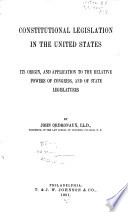 When the legislative and executive powers are united in the same person, or in the same body of magistrates, there can be no liberty ; because apprehensions may arise, lest the same monarch or senate should enact tyrannical laws, to execute them in a... When the legislative and executive powers are united in the same person, or in the same body of magistrates, there can be no liberty ; because apprehensions may arise, lest the same monarch or senate should enact tyrannical laws, to execute them in a...  Constitutional Restraints Upon the Judiciary: Hearings Before the ... - Page 239by United States. Congress. Senate. Committee on the Judiciary. Subcommittee on the Constitution - 1982 - 591 pagesFull view Constitutional Restraints Upon the Judiciary: Hearings Before the ... - Page 239by United States. Congress. Senate. Committee on the Judiciary. Subcommittee on the Constitution - 1982 - 591 pagesFull view - About this book
 | John Ordronaux - 1891 - 716 pages
...be justly pronounced the very definition of tyranny. " There can be no liberty," says Montesquieu, " where the legislative and executive powers are united in the same person, or body of magistrates." This fundamental truth in the foundation of popular government was recognized by the builders of the... | |
 | Jabez Gridley Sutherland - 1891 - 836 pages
...Montesquieu and other writers upon constitutional government, that constitutional liberty cannot exist where the legislative and executive powers are united in the same person. Mr. Madison considers the qualified veto accorded to the president as effecting a partial distribution... | |
 | 1915 - 556 pages
...liberty, it is requisite the government be so constituted that one man need not be afraid of another. When the legislative and executive powers are united in the same person, or in the same body of magistrates, there can be no liberty ; because apprehensions may arise, lest the... | |
 | Henry Cabot Lodge - 1892 - 642 pages
...The reasons on which Montesquieu grounds his maxim are a further demonstration of his meaning. " When the legislative and executive powers are united in the same person or bod}'," says he, " there can be no liberty, because apprehensions may arise lest the same monarch or... | |
 | James Bradley Thayer - 1894 - 470 pages
...admitted to a legislative vote. From these facts, by which Montesquien was gnided, it may clearly he inferred that, in saying " There can be no liberty...body of magistrates," or, "if the power of judging he not separated from the legislative and executive powers," he did not mean that these departments... | |
 | Alexander Hamilton, John Jay, James Madison - 1894 - 980 pages
...reasons on which Montesquieu grounds his maxim, are a further demonstration of his meaning. " When the Legislative and Executive powers are united in the same person or body," says he, " there can be no liberty, because apprehensions may arise lest the name monarch or senate... | |
 | George A. Sanders - 1895 - 416 pages
...States and given to the people directly, in compliance with a somewhat popular clamor. Montesquieu says: "There can be no liberty where the legislative and...united in the same person or body of magistrates." The House of Representatives and the President could easily unite the legislative and executive departments... | |
 | James Bradley Thayer - 1895 - 1214 pages
...as often to attend and participate in its deliberations, though not admitted to a legislative vote. From these facts, by which Montesquieu was guided,...it may clearly be inferred that, in saying " There ели be no liberty where the legislative and executive powers are united in the sume person, or body... | |
 | Thomas Francis Bayard - 1896 - 52 pages
...departments of power should be separate and distinct." "There can be no liberty," said Montesquieu, "where the legislative and executive powers are united in the same person or body of magistrates." 21 remarkable page in the history of civilized mankind. The echoes of the savage war-whoop, the crack... | |
 | James L. Wolcott - 1896 - 82 pages
...Spirit of Laws, Book XI, Chapter 6, entitled "On the Constitution of England," Montesquieu says : When the legislative and executive powers are united in the same person, or in the same body of magistrates, there can be no liberty ; because apprehensions may arise, lest the... | |
| |